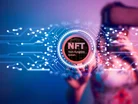Opinion: Real-World Use Cases for NFTs in Finance and Trade

Everywhere you look, from the art world to major businesses and even high profile celebrity merchandise, NFT technology is poised to change the nature of digital ownership forever.
However, behind the fanfare of owning digital items is a much bigger and more important picture. NFTs are on the verge of completely revolutionizing trade finance and global commerce. There is the potential to tokenize a wide range of assets and connect real-world finance origination to the decentralized finance (DeFi) markets. Trade finance instruments, such as fixed income products and investment notes, can securely move along the blockchain in a manner that brings transparency, facilitates seamless settlement, and extends liquidity. At the same time, smart contracts eliminate intermediaries, reduce counterparty risk and preserve the integrity of deliverables.
We’re talking about a new class of financial assets, as well as a significant overhaul to almost every payment system, financial service, and supply chain in the world. And it may be coming sooner than most think.
How NFTs Can Play Into Trade Finance
NFTs are more than just jpegs on a blockchain — they represent digital ownership. They are built upon smart contracts and blockchain technology, the same decentralized networks that power many popular cryptocurrencies. Blockchain platforms are, by definition, trustless, highly secure, and offer completely verifiable data and immutable ledger history. Smart contracts, meanwhile, are self-executing, predetermined agreements that reside on the blockchain and define how the assets on the blockchain work.
Leveraging this, NFTs can take any type of information, be it an image, a 3D model, a document, anything really, and give it a form of uniqueness and tangibility by making it cryptographically unique from any other batch of data — even if otherwise identical.
This means that NFTs represent a fundamentally more useful form of digital information. The data encoded into an NFT cannot be altered, counterfeited, or in any way accessed by anyone, not in possession of the appropriate cryptographic keys. Even if an attacker should manage to steal an NFT, the history and destination would still be completely visible to everyone.
You can also tokenize contract agreements themselves with Liability NFTs and Asset NFTs which are created to show ownership of a given contract for the promisor, the party who makes a promise, and the promisee, the party receives the benefits of a contract.
For businesses and trade finance, this opens up a whole new world of possibilities for handling sensitive data. More importantly, it provides a mechanism for creating compelling new products, IDs, payment rails, supply chain dynamics, and much more. Take, for example, using NFTs to create a blockchain “receipt” that can track a product all the way from raw material acquisition to landing on a retail shelf. Every step of the process, every hand on the goods, every purchase or sale along the way would all be recorded immutably — better still, with a minimum of human intervention.
Trade Finance also faces complex regulatory and supply chain procedures involving multiple moving parts and requires a great deal of trust. It is also a sector that remains highly susceptible to document fraud. NFTs can remove those barriers, eliminate fraud and reduce reliance on middlemen by tokenizing assets and documents into a single immutable digital token.
This not only stands to minimise the rate of illicit activity in trade finance, but it also means that companies stand to save money on overhead, wages, and human error.
NFTs Can Do Even More
Redefining and streamlining how businesses operate is a significant first step, but there is a lot more that NFTs and smart contract platforms can offer to the trade finance industry.
NFTs, for example, could allow startups to create digital representations of commodities and explore new models of raising capital through a frictionless system. Furthermore, the structure and transparency of blockchains make it relatively easy for any entity to stay inside a regulatory framework once those frameworks are fully locked down. In fact, everything from debt management processes to the provenance of goods can be streamlined and verified using NFTs.
The best part is, it’s already possible — and happening. Blockchains like the XDC Network are currently being tested for use as trade finance systems. In September, leveraging the XDC network, Tradeteq — a trade finance distribution firm — executed one of the world's first complete, end-to-end, on chain, tokenized invoice finance transactions.
The Beginning of a New Paradigm
While the basic technology and underlying principles already exist, there’s still a lot of work to be done to set up more complex rails for moving these assets and build new protocols to ensure their continued veracity at every step in the system.
Integration into existing financial firms, regulatory structures, and an overall greater education across multiple industries are similarly crucial if this shift is to become global. Many local governments and national politicians are also researching the potential, so there is already some momentum.
Anything less, and the rollouts of these new products could be clumsier than they need to be. In any event, the possibilities they offer will more than likely be much more broadly understood at some point in the future, and a true renaissance in trade finance could occur. The only thing holding this back is for more players to recognise what is happening and seize the opportunity while it is still early.
About The Author: R. Quincy Jones is an XDC Foundation developer, who on behalf of the XDC Network is building new standards and applications for the XDC Network. With over four years in cloud development, and a growing following on YouTube: CoinClubCrypto, Jones is well-suited to break down the fundamentals of blockchain-based technologies for general audiences.

